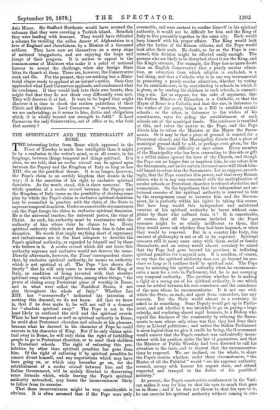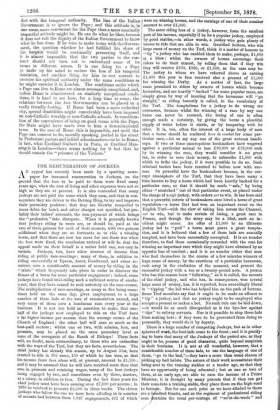THE SPIRITUALITY AND THE TEMPORALITY AT ROME. T HE interesting letter
from Rome which appeared in the Times of Tuesday is made less intelligible than it might be by a confusion in the writer's mind, or at all events, in his language, between things temporal and things spiritual. It is clear, we are told, that no modus vivendi can be agreed upon between the Papacy and the Kingdom of Italy so long as Leo XIII. sits on the pontifical throne. It is no longer, however, the Pope's claim to an earthly kingdom that stands in the way ; it is the assertion of his right to exclusive spiritual dominion. As the words stand, this is sheer nonsense. The whole question of a modus vivendi between the Papacy and the Kingdom of Italy turns on the possibility of devising some plan by which the Pope's claim to exclusive spiritual dominion may be reconciled in practice with the claim of the State to supreme temporal dominion. Under no conceivable circumstances can the Pope forego his claim to exclusive spiritual dominion. He is the universal teacher, the universal pastor, the vicar of Christ. As such, his authority must be coextensive with the authority of him whose vicar he claims to be. Every spiritual authority which is not derived from him is false and deceptive. No words that imply anything short of supremacy and exclusiveness are in the least adequate to describe the Pope's spiritual authority, as regarded by himself and by those who believe in it. A modus vivendi which did not leave this authority supreme and exclusive would not deserve the name. Directly afterwards, however, the Times' correspondent shows that, by exclusive spiritual authority, he means an authority which is not spiritual at all. The Pope "has shown dis- tinctly" that he will only come to terms with the King of Italy, on condition of being invested with that absolute spiritual sway which would give him, among other things, "the power of closing every Protestant place of worship in Rome, and in what were called the Pontifical States, if not also throughout the whole of Italy." Whether Leo XIII. has " unreservedly " indicated his intention of making this demand, we do not know. All that we know is, that if he does make it, he will not call it a demand for "absolute spiritual sway." The Pope is not in the least likely to confound the civil and the spiritual swords. When he had temporal as well as spiritual authority in Rome, he could shut Protestant churches and schools at his pleasure, because what he decreed in his character of Pope he could execute in his character of King. But if he only claims spiri- tual sway in Rome, he will only claim the right of forbidding people to go to Protestant churches, or to send their children to Protestant schools. The right of enforcing this pro- hibition by other than spiritual penalties has gone from him. Of the right of enforcing it by spiritual penalties he cannot divest himself, and any negotiations which may have been going on, or which may hereafter go on, for the establishment of a modus vivendi between him and the Italian Government, will be mainly directed to discovering some formula which, while leaving the Pope's" spiritual authority untouched, may lessen the inconveniences likely to follow from its exercise.
That these inconveniences might be very considerable is Obvious. It is often assumed that if the Pope were only reasonable, and were content to confine himself to his spiritual authority, it would not be difficult for him and the King of Italy to live peaceably together in the same city. Each would busy himself with his proper affairs. The King would look after the bodies of the Roman citizens, and the Pope would look after their souls. No doubt, so far as the Pope is con- cerned, this division might be effected easily enough. The persons who are likely to be disturbed about it are the King, and the King's servants. For example, the Pope has no more doubt than an English Conservative that a purely secular educa- tion, an education from which religion is excluded, is a bad thing, and that a Catholic who is in any way instrumental in promoting a purely secular education, whether by voting for its establishment, or by contributing to schools in which it is given, or by sending his children to such schools, is commit- ting a sin. Let us suppose, for the sake of argument, that the Italian Minister of Education is a Catholic, or that the Mayor of Rome is a Catholic, and that the one, in deference to the wishes of his party, brings in a Bill to establish secular schools ; or the other, in deference to the wishes of his constituents, votes for aiding the establishment of such schools out of the municipal funds. The confessor is troubled at this, and refers the matter to the Pope, and the Pope directs him to refuse the Minister or the Mayor the Sacra- ments. Or it may be that a piece of ground is wanted for a Protestant church, and the Municipality directs that a piece of municipal ground shall be sold, or perhaps even given, for the purpose. The same difficulty at once arises. Every member of the Municipality who has been consenting to this sale or gift is a wilful sinner against the laws of the Church, and though the Pope can no longer fine or imprison him, he can refuse him the Sacraments, and under certain circumstances will think him- self bound to refuse him the Sacraments. Let us suppose, accord- ingly, that the Pope exercises this power, and that every Roman citizen who is in any way concerned with the multiplication of secular schools or Protestant churches is refused absolution and communion. On the hypothesis that the independent and un- fettered exercise of his spiritual authority is reserved to him by the arrangement come to between him and the Govern- ment, he is perfectly within his rights in taking this course.
But how long would this independent and unfettered exercise of his spiritual authority be borne without com- plaint by those who suffered from it ? It is conceivable, of course, that all the persons included in the Papal censures might be so wholly indifferent to them, that they would never ask whether they had been imposed, or when they would be removed. But in a country like Italy, this amount of philosophy is not at all to be expected. Spiritual censures still in many cases carry with them social or family discomforts, and an outcry would almost certainly be raised that the Pope had gone beyond his province in inflicting spiritual penalties for temporal acts. It is needless, of course, to say that the spiritual authority does not go beyond its pro- vince so long as it confines itself to spiritual acts. The Pope may be misusing his spiritual authority when he excommuni- cates a man for a vote in Parliament, but he is not usurping any temporal authority. The question whether he is making a right or a wrong use of his spiritual authority, is one which must be settled between his own conscience and the conscience of the man whom he excommunicates. It is not one with which the State, as such, and apart from concordats, has any concern. But the State would almost to a certainty be asked to do something. Some Deputy would get up in Parlia- ment, and ask whether it was intended to go on paying a large subsidy, and rendering almost regal honours, to a Bishop who repaid the kindness of the community by refusing the Sacra- ments to men whose only crime was that they had done their duty as Liberal politicians ; and unless the Italian Parliament is more logical than we give it credit for being, the Government would answer that the Pope's conduct was undoubtedly incon- sistent with his position under the law of guarantees, and that the Minister of Public Worship had been directed to call his attention to the facts, and to request that the excommunica- tions be removed. We are inclined, on the whole, to share the Pope's doubts whether, under these circumstances, "the Master of all the Faithful" would "see his supreme authority revered, occupy with honour his august chair, and attend respected and tranquil to the duties of his pontifical ministry."
At present, the Pope's constructive confinement in the Vati- can makes it easy for him to shut his eyes to much that goes on in Rome ; and if he does not choose to shut his eyes to it, he can exercise his spiritual authority without coming in con- filet with the temporal authority. The line of the Italian Government is to ignore the Pope ; and this attitude is, in one sense, more convenient for the Pope than a more nominally respectful attitude might be. He can do what he likes, because it does not suit the dignity of the Italian Government to know what he has done. If he were to make terms with the Govern- ment, the question whether he had fulfilled his share of the bargain would be continually presenting itself, and it is almost impossible that the two parties to the con- tract should not turn out to understand some of its terms in different senses. It is one thing for a Pope to make up his mind to endure the loss of his temporal dominion, and another thing for him to rest content to exercise his spiritual authority under the same conditions as he might exercise it in London. The conditions under which a Pope can live in Rome are almost necessarily exceptional, and, unless Rome is administered on similarly exceptional condi- tions, it is hard to see how, for a long time to come, the relations between the two Governments can be placed on a really friendly footing. If Rome had been a mere cathedral city, special disabilities might conceivably have been imposed on non-Catholic worship or non-Catholic schools. In considera- tion of the convenience of being on good terms with the Pope, the State might have made over to him a denominational town. In the case of Rome this is impossible, and until the Pope can consent to be, morally speaking, jostled in the street by Protestant pastors and infidel schoolmasters—lobe in Rome, in fact, what Cardinal Guibert is in Paris, or Cardinal Man- ning is in London—there seems nothing for it but that he should remain the "prisoner of the Vatican."































 Previous page
Previous page